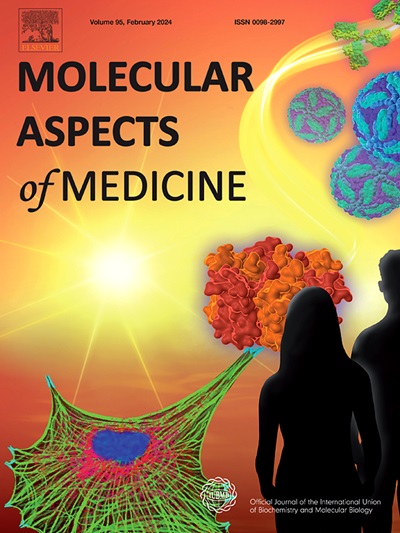Post-translational modifications: Bridging viral infections and inflammatory bowel disease
IF 10.3
2区 医学
Q1 BIOCHEMISTRY & MOLECULAR BIOLOGY
引用次数: 0
Abstract
Macrophages are key innate immune cells that defend against pathogens, maintain tissue homeostasis, and regulate inflammation. A complex network of post-translational modifications (PTMs) controls the flexibility and adaptability of macrophage functions. These modifications change the structure, function, location, and interactions of proteins through covalent mechanisms such as phosphorylation, ubiquitination, SUMOylation, acetylation, and glycosylation. This enables macrophages to respond quickly and accurately to changes in their microenvironment. Dysregulated macrophage function is pivotal to the pathophysiology of inflammatory bowel disease (IBD) and the resultant outcomes following viral infections. Recent evidence suggests that macrophage PTMs provide a mechanistic link between IBD and viral infection. Viral infections may accelerate disease onset or exacerbate IBD activity. Viruses exploit the PTM machinery of host cells for their replication and immune evasion. This review discusses how PTM changes in macrophages caused by viral infections can lead to a long-lasting, pro-inflammatory state that could tip the balance of intestinal immunity toward chronic IBD. We elucidate the functions of traditional PTMs such as phosphorylation, ubiquitination, SUMOylation, acetylation, and glycosylation, in conjunction with emerging modifications such as lactylation and citrullination (deimination). We emphasize their distinct roles in both antiviral responses and IBD pathogenesis, while also exploring therapeutic strategies targeting PTM pathways.
翻译后修饰:桥接病毒感染和炎症性肠病。
巨噬细胞是防御病原体、维持组织稳态和调节炎症的关键先天免疫细胞。一个复杂的翻译后修饰(PTMs)网络控制着巨噬细胞功能的灵活性和适应性。这些修饰通过共价机制改变蛋白质的结构、功能、位置和相互作用,如磷酸化、泛素化、SUMOylation、乙酰化和糖基化。这使得巨噬细胞能够快速准确地对微环境的变化做出反应。巨噬细胞功能失调对炎症性肠病(IBD)的病理生理和病毒感染后的结果至关重要。最近的证据表明,巨噬细胞PTMs提供了IBD和病毒感染之间的机制联系。病毒感染可能加速疾病发作或加重IBD活动。病毒利用宿主细胞的PTM机制进行复制和免疫逃避。这篇综述讨论了病毒感染引起的巨噬细胞PTM变化如何导致长期的促炎状态,从而使肠道免疫平衡向慢性IBD倾斜。我们阐明了传统PTMs的功能,如磷酸化、泛素化、sumo化、乙酰化和糖基化,以及新兴的修饰,如乳酸化和瓜氨酸化(脱胺化)。我们强调它们在抗病毒反应和IBD发病机制中的独特作用,同时也探索了针对PTM途径的治疗策略。
本文章由计算机程序翻译,如有差异,请以英文原文为准。
求助全文
约1分钟内获得全文
求助全文
来源期刊

Molecular Aspects of Medicine
医学-生化与分子生物学
CiteScore
18.20
自引率
0.00%
发文量
85
审稿时长
55 days
期刊介绍:
Molecular Aspects of Medicine is a review journal that serves as an official publication of the International Union of Biochemistry and Molecular Biology. It caters to physicians and biomedical scientists and aims to bridge the gap between these two fields. The journal encourages practicing clinical scientists to contribute by providing extended reviews on the molecular aspects of a specific medical field. These articles are written in a way that appeals to both doctors who may struggle with basic science and basic scientists who may have limited awareness of clinical practice issues. The journal covers a wide range of medical topics to showcase the molecular insights gained from basic science and highlight the challenging problems that medicine presents to the scientific community.
 求助内容:
求助内容: 应助结果提醒方式:
应助结果提醒方式:


